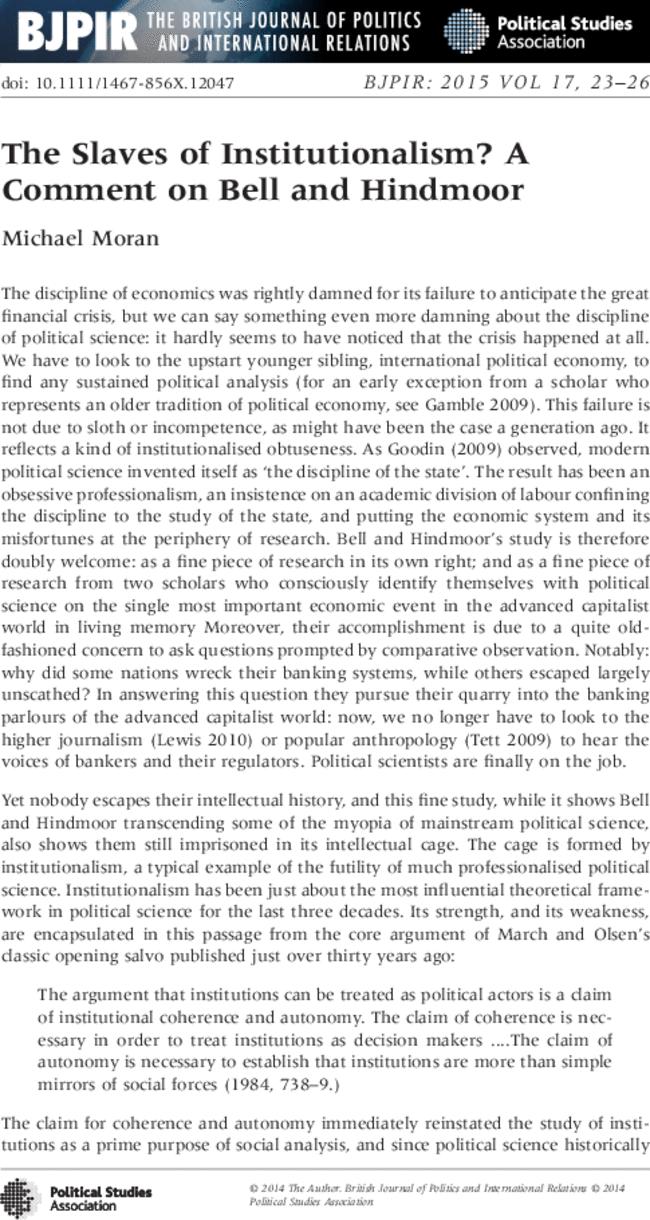制度主义的奴隶?评贝尔和欣德莫尔
IF 3.4
2区 社会学
Q2 INTERNATIONAL RELATIONS
British Journal of Politics & International Relations
Pub Date : 2014-05-21
DOI:10.1111/1467-856X.12047
引用次数: 0
摘要
本文章由计算机程序翻译,如有差异,请以英文原文为准。

The Slaves of Institutionalism? A Comment on Bell and Hindmoor
The discipline of economics was rightly damned for its failure to anticipate the great financial crisis, but we can say something even more damning about the discipline of political science: it hardly seems to have noticed that the crisis happened at all. We have to look to the upstart younger sibling, international political economy, to find any sustained political analysis (for an early exception from a scholar who represents an older tradition of political economy, see Gamble 2009). This failure is not due to sloth or incompetence, as might have been the case a generation ago. It reflects a kind of institutionalised obtuseness. As Goodin (2009) observed, modern political science invented itself as ‘the discipline of the state’. The result has been an obsessive professionalism, an insistence on an academic division of labour confining the discipline to the study of the state, and putting the economic system and its misfortunes at the periphery of research. Bell and Hindmoor’s study is therefore doubly welcome: as a fine piece of research in its own right; and as a fine piece of research from two scholars who consciously identify themselves with political science on the single most important economic event in the advanced capitalist world in living memory Moreover, their accomplishment is due to a quite oldfashioned concern to ask questions prompted by comparative observation. Notably: why did some nations wreck their banking systems, while others escaped largely unscathed? In answering this question they pursue their quarry into the banking parlours of the advanced capitalist world: now, we no longer have to look to the higher journalism (Lewis 2010) or popular anthropology (Tett 2009) to hear the voices of bankers and their regulators. Political scientists are finally on the job.
求助全文
通过发布文献求助,成功后即可免费获取论文全文。
去求助
来源期刊
CiteScore
4.90
自引率
5.60%
发文量
35
期刊介绍:
BJPIR provides an outlet for the best of British political science and of political science on Britain Founded in 1999, BJPIR is now based in the School of Politics at the University of Nottingham. It is a major refereed journal published by Blackwell Publishing under the auspices of the Political Studies Association of the United Kingdom. BJPIR is committed to acting as a broadly-based outlet for the best of British political science and of political science on Britain. A fully refereed journal, it publishes topical, scholarly work on significant debates in British scholarship and on all major political issues affecting Britain"s relationship to Europe and the world.

 求助内容:
求助内容: 应助结果提醒方式:
应助结果提醒方式:


